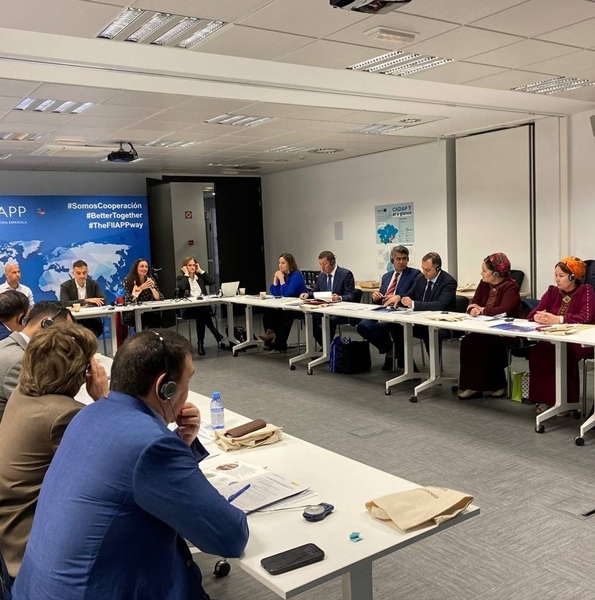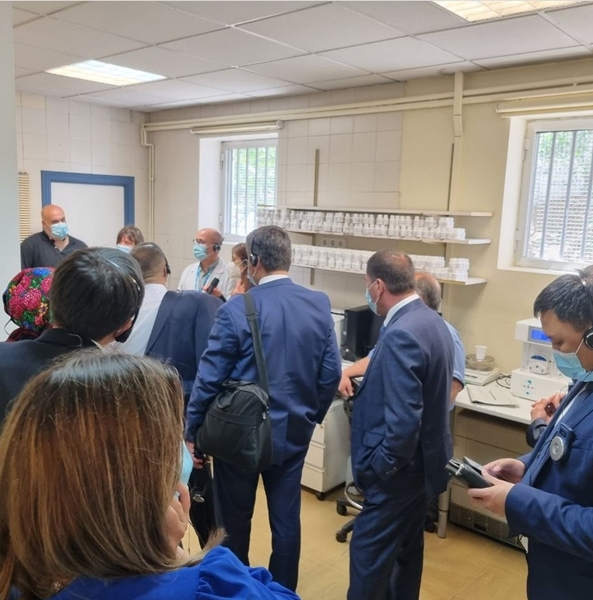Delegates from institutions in Kazakhstan, Kyrgyzstan, Tajikistan, Turkmenistan and Uzbekistan – key countries on the heroin route to Europe participate in a study visit today in Madrid and Barcelona in order to learn about the Spanish experience and improve their institutional capacity to develop, coordinate and implement drug policies, as well as to learn about the prevention, treatment and harm reduction services that Spain carries out in relation to problematic drug use.
The experts of the delegation will visit the Government Delegation for the National Plan on Drugs of the Ministry of Health, various resources of the Subdirectorate General of Addictions of Madrid Salud of the Madrid City Council, the General Secretariat of Penitentiary Institutions and the Intelligence Centre against Terrorism and Organised Crime (CITCO) of the Ministry of the Interior, the Madrid VII Penitentiary Centre of Estremera, the Programme of Addictions, HIV, STIs and Viral Hepatitis and various resources of the Public Health Agency of Catalonia.
For the Director of CADAP, Ernest Robelló, this visit “highlights the importance of international coordination in the implementation of evidence-based drug policies carried out within the EU, especially taking into account the cross-cutting nature of this issue and its different implications“.
For Peggy Martinello, Director of Public Administration and Social Affairs at the FIIAPP, the visit “is a forum for mutual learning between counterpart institutions in a region with different approaches to the implementation of drug policies“. In this line, he underlines the importance of this initiative to foster the exchange of information on both sides of the Eurasian continent and to favour the integration of evidence-based public policies.
This exchange will strengthen institutional cooperation between those responsible for developing, coordinating and implementing drug policies. In addition, the delegation will have the opportunity to learn first-hand about the addiction care provided in a prison in the Community of Madrid, the operation of care and monitoring centres for drug addiction in Madrid and Barcelona, as well as innovative initiatives in the application of opioid substitution therapies and harm reduction such as those offered by the Bagaría Casanova pharmacy in L’Hospitalet de Llobregat or the REDAN La Mina centre in Sant Adriá del Besòs.
Supervised drug consumption rooms for the general public
In addition, the Central Asian delegation will visit several supervised drug consumption rooms in Barcelona, places where illicit drugs can be consumed under the supervision of health personnel, which have been operating in Europe for more than three decades.
As the European Monitoring Centre for Drugs and Drug Addiction (EMCDDA) notes, “these facilities aim to reduce the risks of disease transmission through unhygienic injecting, prevent overdose deaths and connect high-risk drug users to addiction treatment and other health and social services”.
CADAP is the Central Asia Drug Action Programme (CADAP).
It is an initiative of the European Union to promote the development of effective drug demand reduction policies in Central Asian countries. It is currently in phase 7. In line with the EU Drug Strategy 2021-2025 and the Joint Communication on “The EU and Central Asia: New opportunities for a stronger partnership”, CADAP 7 reflects the continuity of the EU’s long-term commitment to partners from Central Asia to help further. strengthen their national drug demand reduction plans and continue to cooperate in the development of integrated and balanced drug policies. /// CADAP, 30 May 2023
#CADAP, #Kazakhstan, #Kyrgyzstan, #Turkmenistan, #Uzbekistan, #Tajikistan, #Spain

